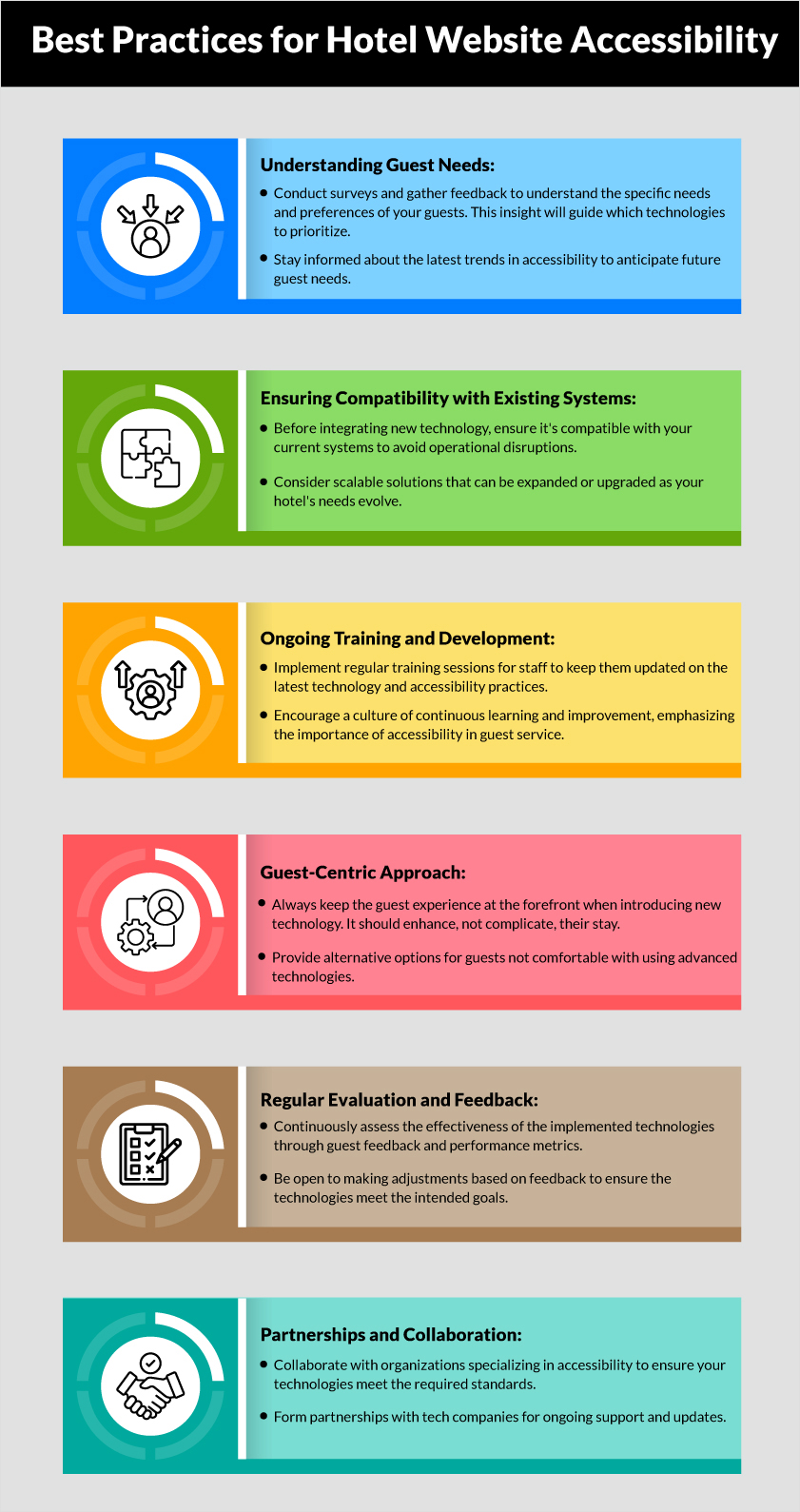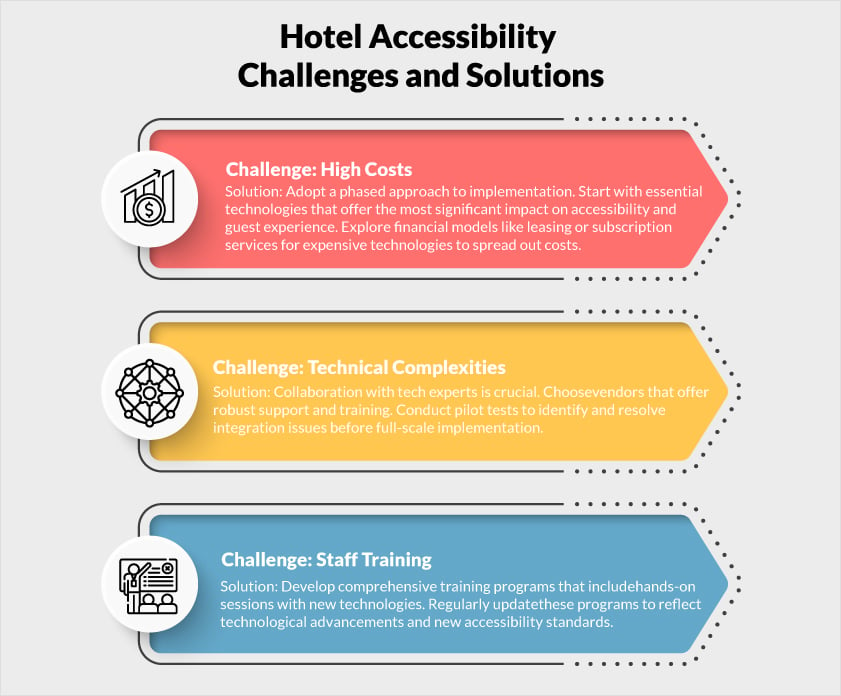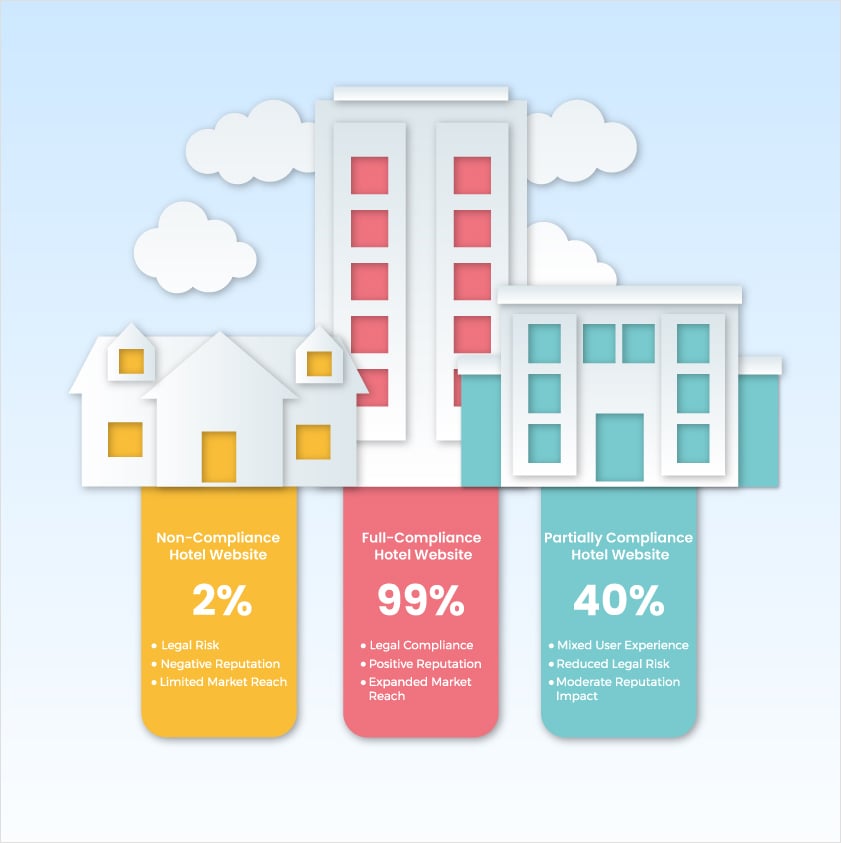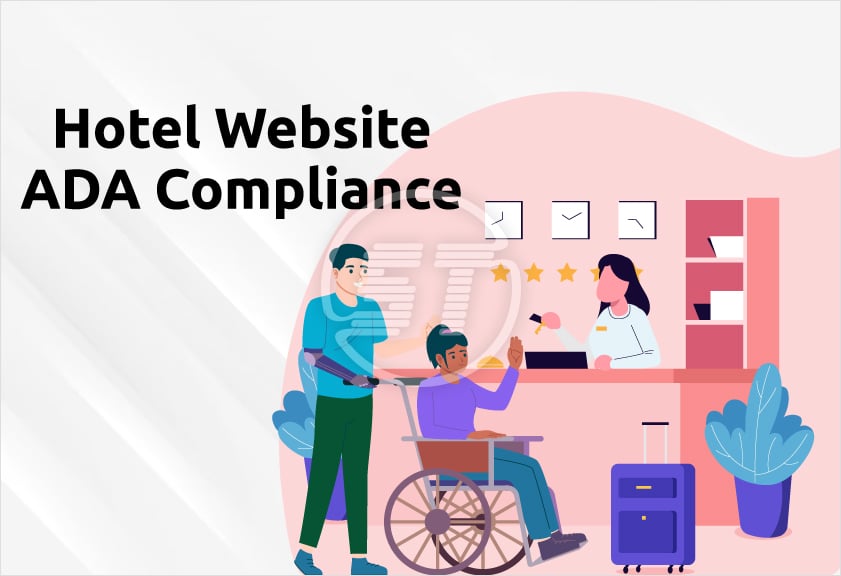Ensuring digital accessibility is a key for businesses across various industries including the hospitality industry. Hotels can significantly enhance the guest experience by improving digital accessibility. From booking accommodations to navigating the hotel’s website and utilizing on-site amenities, a focus on accessibility ensures that all guests, regardless of their abilities, can enjoy a seamless and inclusive stay.
For travellers with any sort of disabilities, digital accessibility is critical to enable them the access choosing a right hotel for stay. And not to miss that these travellers spend a significant amount annually on hotels. Increasing demands always seek for proper supply. And since hospitality industry is showing a huge demand for digital accessibility, hotels must focus on the accessibility of their websites, apps, and kiosks to cater every single guest coming to them.

Let’s dive deeper to understand how hotels can enhance digital accessibility.
Pointers to work to improve the digital accessibility of hotels!
Booking process accessibility
The online booking process is a critical facet of a hotel’s digital presence. Ensuring that the booking platform is accessible involves providing alternative input methods, clear instructions, and error notifications. Additionally, offering multiple contact options, such as dedicated accessible phone numbers or email, allows guests to seek assistance if needed.
Booking dates accessibility
People check for their desired dates before looking for hotel room options. It becomes a complicated process for screen reader users because of the way dates can be checked. Most hotel sites have grid calendars to display dates and often these calendars don’t work properly for screen readers. Hotels can make this process simple for disabled users by providing drop-down menus to choose months and dates.
Accessible mobile apps
Many guests prefer using mobile apps for booking and accessing information during their stay. Hotels should design and maintain responsive mobile apps with accessibility in mind. This involves offering customizable text sizes, voice command integration, and other features that cater to a diverse range of user needs.
Information in table form
If hotel is providing any crucial information in table form, the tables must be easy to understand for screen readers. If columns and rows have coding errors, they can be confusing for screen readers and their users because they will hear combination of jumbled words and numbers. Thus, to avoid such a mess, there must be correct underlying coding for each row and column, or else tables should not be used.
Accessible PDFs
PDF accessibility is important to offer an accessible website or application to users. Thus, if menus or other details have been uploaded on the hotel site in PDF format, they must be in an accessible format.
Communication Access
Booking confirmation emails, text messages, or any other form of communication between hotels and guests must be easy to access. Ensure that emails don’t suffer from inaccessibility issues and all modes of communication comply with ADA or WCAG standards.
Assistive Technology Compatibility
Hotel sites and apps must be compatible with all modern assistive technologies for example screen readers, alternative input devices, etc. It helps every individual to access their desired information via assistive technology and improves user experience to another level.
Multilanguage Accessibility
A multilingual accessible hotel website ensures that visitors from diverse linguistic backgrounds can easily navigate and engage with its content. By offering information in multiple languages, such a website caters to a global audience, enhancing user experience and facilitating bookings for guests worldwide.
Website images with proper description
Hotel websites must have images with suitable alternative text because mostly they convey some crucial information and without alt text, they will not be accessible to everyone. Pictures help hotels to show how many amenities they offer to their customers along with their cleanliness status and attractive view. Alt text makes those images understandable for screen reader users. Potential customers trust these pictures to fetch information before booking hotel rooms.
Multimedia Accessibility
Include captions, audio descriptions, and transcripts with multimedia content to ensure that users with hearing disability can consume the content without encountering any trouble. It is imperative as per WCAG standards.
Regular digital accessibility audits
Conducting regular accessibility audits of digital platforms and physical spaces ensures that a hotel remains in compliance with accessibility standards. This ongoing evaluation allows for timely updates and improvements based on evolving accessibility guidelines and user feedback.
Seeking user feedback
Gather feedback from guests including those with disabilities to get valuable insights into areas that may need improvements. Guest feedback can be collected through surveys, online reviews, or direct communication, allowing hotels to address specific concerns and continuously enhance their accessibility efforts.

Importance of digital accessibility for hotels!
There are several reasons that make it crucial for the hospitality industry to focus on digital accessibility. Some of the profound reasons are:
Non-discriminatory environment or Inclusivity
Services offered by hotels ought to be accessible to everyone irrespective of their abilities. Inclusivity helps remove hindrances that cause inaccessibility and improve user engagement by allowing everybody to access desired information, communicate seamlessly, and perform actions independently. Serving a diverse user base is the core concept of the hospitality business and inclusivity aims to achieve that vision.
Legal Requirements
Likewise, the ADA has a mandatory requirement of offering accommodation to disabled individuals by including suggested guidelines. Many countries have other laws and regulations to mandate equal access to digital products and services. Hotels are also abided by region-wide accessibility laws. Thus, to comply with legal requirements and reduce litigation risk, it is important to prioritize accessibility for websites or applications.
Enhanced conversions
Digital accessibility is a key factor in tapping into bigger audience segments. The hospitality industry needs to design digital products keeping accessibility in mind to improve their usability and engagement. The more engagement, the more conversions can be expected.
Cutting-edge benefits
Modern customers look for differentiation to choose a product or service. Thus, accessibility inclusion can provide a competitive advantage to a hotel against its competitors. Accessible features improve user experience for everyone and appeal to them to use such accessible websites.

Open Your Doors to Millions More Guests with Accessible Hotel Website!
Digital accessibility is important for guests with disabilities as well. Thereby hotels must prioritize accessibility along with including various compelling features of their hotels on their websites or applications. More features might entice customers, but to engage them, website accessibility is needed.
Skynet Technologies offers complete and comprehensive web accessibility solutions including existing website ADA compliance, redesigning your website with ADA compliance, a new ADA compliance website, accessibility audit and remediation, and more. We help organizations stay ahead of the competition while following Web Content Accessibility Guidelines (WCAG) and meeting standards and regulations. For more information, reach out to hello@skynettechnologies.com
